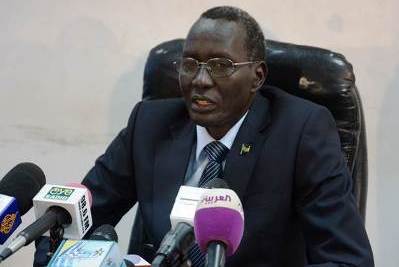S. Sudan rejects calls for suspension of new oil contracts
July 28, 2014 (JUBA) – The South Sudanese government says it would not relent to recent demands for suspension of all new oil contracts, arguing that such a decision was not in the country’s best interest.

The minister’s response comes more than month after Global Witness, a UK-based campaign group, called on South Sudan government to immediately issue a moratorium on all new contracts in its oil industry.
By issuing such a moratorium, the group argued, the young nation’s leaders would ensure that the population’s future was not as well sold.
Minister Dau, in the letter Sudan Tribune obtained, explained why Global Witness’s call were unrealistic, saying the young nation’s budget and economy largely depended on oil production and sale.
“The economy of South Sudan is current substantially dependent on our petroleum industry. Even while we seek to diversify economy and attract new investments in new industries, we foresee the oil industry as remaining a substantial, if not predominant sector of our economy for a number of yours into future,” he said.
Since the outbreak of conflict in the country, however, oil revenues have reportedly been diverted to finance the war, and there is a real risk that multi-million-dollar payments made by companies to secure future projects will also fail to reach the development budget.
But the petroleum minister said it was essential that exploration and development activities continue to expand in the existing blocks and new ones, so that the levels of oil production are maintained and increased over time.
Granting of the new oil contracts, he observed, cannot be put off because it would benefit the country find funds to support developmental projects like the construction of the alternative oil pipeline and development of transportation corridors to the foreign countries for shipment.
“Petroleum industry business is a long time. It requires substantial investments over long period of time before oil or gas can be produced and delivered to market, domestic or foreign. A contractor entered into day, may not result in commercial production of oil or natural gas for a number of years, perhaps as long as decade or even longer,” the minister said in the letter.
“Any artificial undue delay in entering into contracts will simply prolong the time before new sources of oil or natural gas are developed and used to generate new sources of revenue. The same lead time is required for other substantial investments in the petroleum industry, such as for oil pipelines and other essential infrastructure,” it adds.
Global Witness also said South Sudan government had spent months developing laws to ensure that the country’s oil sector is not a source of corruption or conflict, but allegedly fell short of implementing these regulations.
The petroleum minister, however, assured that issues relating to accountability and transparency raised by the UK-based campaign group would be given full attention in accordance with the 2012 Petroleum Act, which outlines functions and discretions.
“I want to reassure you that South Sudan remains committed to the transparency obligations of the petroleum Law as cited in the Global Witness report. It is a matter of extreme importance, to the benefits of the citizens of South Sudan, that the government be able to fund its budget. New contracts will not materially impact the funding of the current budgets, because new oil and gas production will not result in a number of years,” said Dau.
“Whatever proceeds are received in forms of bonuses or otherwise under any new contracts will be minimised in relations to the national budget and will not affect policy or overall capabilities of the government,” he added.
South Sudan is the world’s most oil dependent country, with 98% of government revenue coming from oil sales at independence in July 2011.
(ST)
